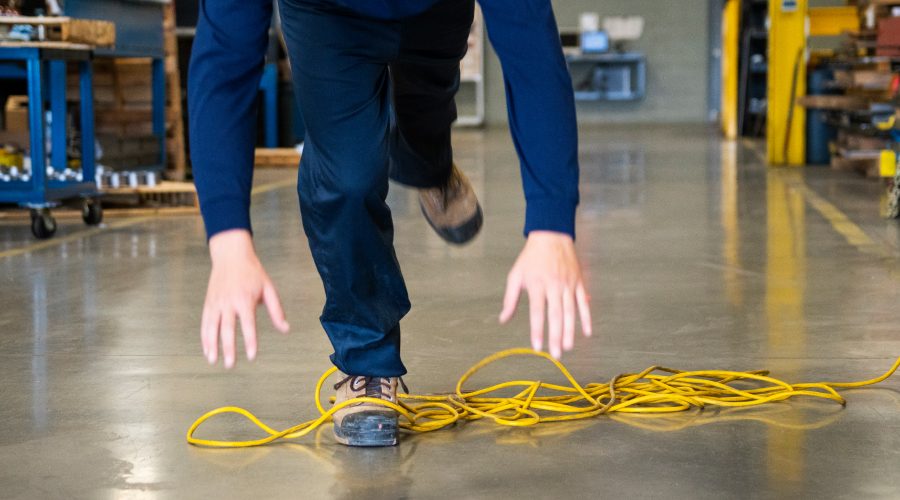
According to the New Hampshire Department of Labor, “…every employer who has any employees, full or part-time, is required to cover these employees with workers’ compensation insurance written by a carrier. It does not matter if they are related, such as daughter, son, husband, etc. It also does not matter if the business is a non-profit organization.”
Obviously, from industry to industry the types of injuries workers suffer varies greatly. With that said, if you’re injured on the job in any capacity, seek help. You have a right to, and shouldn’t shy away from that right. Avoiding treatment over fear of repercussion is one you shouldn’t have to deal with. In fact, repercussions as a result of a work injury is illegal. So, get treated. Not only to get back to your job, but more importantly, to avoid further ailment. After all, an injured worker equals compromised productivity, and no employer wants that.
For the purpose of discussion, let’s dive into the most common workers’ compensation injuries that we see daily at our practice.
Some of the most common workplace injuries that require orthopaedic treatment include:
Machinery accidents
New Hampshire has a significant footprint in the manufacturing, agriculture, and manual labor industries that often utilize technology and machinery to help “get the job done.” And where there are moving pieces and parts, there’s the possibility of injury. Machinery accidents can range in severity, but no matter what, if you’re injured due to a machinery accident, you should get checked out to make sure any ensuing bruising, aches, or pain isn’t something more serious. With our onsite MRI equipment and team of practitioners and medical staff, we’re here to help guide the process from diagnosis to navigating the actual workers’ compensation claim.
Overexertion
Overexertion is quite common. We’re all trying to “do right” by our company, and with an influx of consumer demand lately, we’re all working longer, harder hours. In some industries, that requires a lot of pushing, pulling, and lifting, which can cause overexertion of our muscular and skeletal systems. What might feel like a minor ache could lead to further exerted strain and injury to the original site or to other parts of your body. Don’t fool around with an injury related to overexertion. Your body needs rest. For the pulls and strains, get your injury checked out by a professional orthopedic doctor who can help you get back on the right track.
Repetitive motion
Many professions can cite some degree of repetition in their work. And it’s in these repetitive motions that your physical being can start to break down. We recommend taking advantage of physical therapy and extracurriculars like yoga to keep your body pliable and healthy. However, when you begin to feel any degree of discomfort in a muscle or joint, don’t wait on getting it checked out. Figuring out the right path forward is essential in ensuring no further damage is done. Utilizing your New Hampshire workers’ compensation benefits is the best way to accomplish this.
Slips, trips, and falls
It’s no secret that a slip, trip, or fall can lead to bruising and broken bones. When we slip, trip, and are in the process of falling, our immediate reaction is to brace ourselves from impact and try to minimize the damage. The kicker here is that in attempting to “soften the blow,’ we might actually add to the severity of the end result. Slips, trips, and falls are a common occurrence in daily life, and, given that we spend so much of our time at work, it makes sense that these accidents wind up happening there, which make up a solid percentage of all workers’ compensation claims. Again, get it checked out. A simple fall can lead to a whole web of complex issues.
Back, knee, and shoulder injuries from falls
Piggybacking off of that last part for a minute; a lot of injuries occurring from slips, trips, and falls usually wind up happening to our back, knee, and shoulders. Back, knee, and shoulder injuries are what we specialize in here at Access Sports Medicine and Orthopaedics. From herniated discs to fractures, bruises, and breaks—all of these parts of your body significantly impact the rest of your waking life, so making certain they’re treated is paramount to your overall physical wellbeing. If you’re experiencing any pain at all in your back, knee, shoulder (or wrist), flex your workers’ compensation benefit and drop in to one of our convenient locations. We’ll help you get back to work just as soon as you are able to.
Sprains and strains of the wrist or ankle
Ankle sprains are painful and are a serious detriment to our mobility. A sprained and strained ankle will not only greatly impact your working life, but your life as a whole. And wrists are a common injury we see here because we try to brace ourselves with our hands as we fall, which, in turn, leads to sprains and strains of the wrist. None of these are fun. But, again, each of them lead to compromised productivity in the workplace, so it’s important to seek treatment.
Remember, if you’re hurt on the job, it’s YOUR choice as to which medical provider you visit to seek care. Don’t let anyone tell you differently. Your employer’s insurance company may attempt to steer you away from choosing your own provider, but ultimately it’s your decision to make. You also have the right to:
- Have medical costs from your work-related injury paid for by your employer.
- Return to your position or receive training to help you obtain another position at the company when you’re physically able to resume labor practices.
- Obtain a portion of your paid salary if you are physically unable to perform your job duties.
On top of helping you figure out the diagnoses and subsequent best care for your work related injury, Access is here to ensure that when you’re ready to go back to work, you are indeed ready. We accomplish this through our:
Work conditioning program
Following a physical therapy regimen (after we’ve figured out the extent of your injury), Access personnel will put you through our work conditioning program, which will get you back into “working shape.” Think of it as bridging the gap between physical therapy and the physical exertion you experience in a typical workday. The program is designed around your job / industry and puts you through physical activity exercises related to your job function(s). You can expect a therapy programming commitment of two hours a session, two to four times a week (for an average of two to three weeks) focused on:
- Strengthening
- Range of motion
- Motor control
- Safe performance of job activities
If you’re injured at work, don’t put your ailments to chance. Put your workers’ compensation benefits to work. If you need help navigating the process, we can help you do just that.



